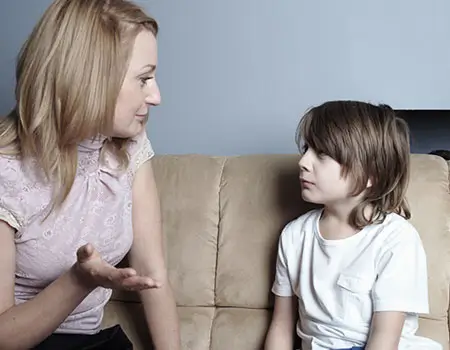Disciplining your child is a critical component to parenting. However, it is not always easy! By definition, discipline is used to teach children about expectations and guidelines, and so it is important and necessary for parents to take the time and effort to determine what is the best form of discipline for any given situation. Here are a few tips for providing positive and effective discipline.
- Ask yourself, “What am I teaching my child through discipline?” The primary purpose of discipline, other than protecting your child from danger, is to teach your child how he or she should behave and to teach them the difference between right and wrong. Therefore, logical consequences should be applied to the behavior. For example, if a child throws crayons on the floor, you would instruct the child to pick up the crayons and play with them in an appropriate manner before they are allowed to use them again. In this case, you are teaching your child that if they don’t treat their belongings with care they won’t be able to enjoy them, rather than disconnecting the consequence from the behavior by sending them to time out or taking away
- Criticize the behavior, not the child. Your child is building their sense of self. If they hear that they are bad, selfish, rude or mean enough times during development they will believe it and will behave accordingly. Make sure you are criticizing the behavior and not the child. For example, say, “I don’t like it when you don’t share your toys with your sister. It isn’t nice, and it keeps her from playing,” instead of “Stop being so selfish and give her the toy.” Additionally, when redirecting your child, try to use positives rather than negatives. For example, instead of “Don’t throw your toys!”, say: “I like it when you play gently with your toys!”
- Praise positive behaviors. Parents and others often pay more attention to negative or unsafe behaviors than the positive ones. However, it is important to praise the child for behaving well. This can be your most powerful discipline tool. Children naturally seek attention from their caregivers, so if they receive positive attention for their positive behaviors there is a higher likelihood they will continue those behaviors. Otherwise, they may misbehave simply to gain your
- Be consistent. Discipline loses meaning when you don’t follow through with the consequences you set. Thus, it’s important to avoid setting unrealistic consequences that you don’t intend to keep, such as claiming you’ll turn the car around and go home if they don’t behave (when you know full-well you’re almost at your destination and have no intention of stopping). Remember, you’re teaching your child that negative actions are followed by the logical, negative
- Learn developmental stages of children. Discipline that works at one stage may not work at another. The more you know about normal developmental stages, the better you will be able to guide your child and even prevent misbehavior. Try to understand what causes your child to act out. For example, adults can moderate their behavior when they’re tired, hungry or bored, but a preschool-aged child cannot. Know what to expect from your child and bring snacks, allow for naps and set them up for success. For example, if you know your child is hungry, do not take them with you to the grocery store at that time.
- Address your stress. Every parent has times when they reach the end of their patience. Being a parent is not easy, so it is important to take care of yourself so you can provide consistency for your child. Stress can cause a parent to respond too harshly to negative behaviors, or simply ignore them because they’re too tired and overwhelmed to respond. Stress and lack of sleep are common among parents, but pay attention to how you are feeling. Discipline should be based on logical consequences to your child’s actions, and not how the parent is feeling that day. If you’re struggling with stress, reach out for help and find ways to take time to meet your own
We learn how to be adults from the adults that raise us. Ask yourself: What kind of adult do you want your child to be? If you’re ever unsure what to do, remember to think about what your child is learning from your actions.
Contact Info
Center for Child Protection
8509 FM 969, Building 2
Austin, Texas 78724
Phone: 512-472-1164
Fax: 512-472-1167
Web: centerforchildprotection.org












